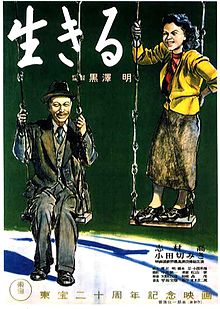Ikiru: Difference between revisions
m commons image |
Removing public domain label, since Kurosawa's estate has been declared the owner until 2036. See talk page... |
||
| Line 58: | Line 58: | ||
[[Category:Japanese films]] |
[[Category:Japanese films]] |
||
[[Category:Japanese-language films]] |
[[Category:Japanese-language films]] |
||
[[Category:Public domain films]] |
|||
[[cs:Žít]] |
[[cs:Žít]] |
||
Revision as of 05:19, 12 March 2008
| 生きる Ikiru | |
|---|---|
 Japanese original poster | |
| Directed by | Akira Kurosawa |
| Written by | Shinobu Hashimoto Akira Kurosawa Hideo Oguni |
| Produced by | Sojiro Motoki |
| Starring | Takashi Shimura |
| Distributed by | Toho |
Release dates | October 9, 1952 (Japan) |
Running time | 143 min. |
| Language | Japanese |
Ikiru (生きる) is a 1952 Japanese film written and directed by the acclaimed Japanese filmmaker Akira Kurosawa. The title Ikiru translates as "to live" in English. The film examines the struggles of a Tokyo bureaucrat and his final quest for meaning.
Plot
The movie stars Takashi Shimura, who played in many of Kurosawa's films (most notably as the leader of Seven Samurai), as Kanji Watanabe. Watanabe is a middle-aged man who has worked in the same monotonous bureaucratic position for decades. Furthermore, his relationship with his son has become strained, as his son and daughter-in-law seem to care mainly about his pension and their future inheritance.
After realizing he has stomach cancer, giving him less than a year to live, Watanabe attempts to come to terms with his impending death. He plans to tell his son about the cancer, but decides against it when his son does not pay attention to him. He then tries to find escape in the pleasures of Tokyo's nightlife, but after one night, he realizes this is not the answer.
Worth noticing in the night club scene is Watanabe's theme song, Gondola no Uta, which he sings to the horror of those watching him. The song is a ballad encouraging young women to find love.
The next day, a chance encounter with one of his colleagues leads him to pursue a different solution. Watanabe is attracted to her joyous love of life and enthusiasm. He opens up to her by saying he just wants to live one day in such a carefree, youthful way like she does. She reveals that her happiness comes from her new job, making toys, which makes her feel like she's friends with all the children of Japan.
Inspired by her example, Watanabe dedicates his remaining time to accomplishing one worthwhile achievement before his life ends; by dint of his persistent will, he is able to overcome the inertia of bureaucracy and turn a mosquito-infested cesspool into a children's playground.
The last third of the film takes place during Watanabe's wake, as his former co-workers try to figure out what caused such a dramatic change in his behavior. His transformation from listless bureaucrat to passionate advocate puzzled them. As the co-workers drink, they slowly realize that Watanabe must have known he was dying. They drunkenly vow to live their lives with the same dedication and passion as he did. They soon find themselves back at work, however, buried under the same meaningless busy-work they had vowed to fight.
An iconic scene from the movie is from the last few moments in Watanabe's life, as he sits on the swing at the park he built. As the snow falls, we see Watanabe gazing lovingly over the playground, at peace with himself and the world. He sings a song about falling in love while still young, for life is short.
References
External links
- Ikiru Full movie available for download, in Japanese with English subtitles
- Ikiru at IMDb
- Bohème Magazine Ikiru: The Art of Living
- Ikiru at the Arts & Faith Top100 Spiritually Significant Films list
- Criterion Collection essay by Donald Richie
- In depth essay on Ikiru
- Ikiru Template:Ja icon at the Japanese Movie Database
